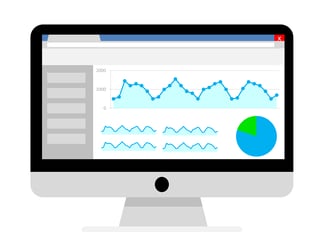
B2B Articles - Jun 28, 2023 10:34:04 AM - By Ava Champion
B2B sales teams are under more pressure than ever to adapt to new ways of working. The marketplace continues to be more competitive as digital-savvy buyers seek to self-educate about solutions for their continuously changing needs, and sales teams that don’t adapt may find themselves falling short of quotas.
 How can B2B salespeople gain a competitive advantage and close more deals? One way is by uniting with the marketing team to create a personalized buyer experience through integrated CRM data.
How can B2B salespeople gain a competitive advantage and close more deals? One way is by uniting with the marketing team to create a personalized buyer experience through integrated CRM data.
Sales teams cannot function without a CRM, but most aren’t reaping the full benefits of their systems. CRMs can hold a ton of valuable data, as long as teams set them up properly and understand how to work within them. In the Hubspot 2023 Sales Trends Report, only 11% of salespeople feel their CRM is extremely effective, while 39% state it is moderately effective.1
Part of the reason CRMs are ineffective for sales teams is because the data input is incomplete or inaccurate. 45% of salespeople have said that “dirty data” (or incomplete data) is their biggest data challenge.2
Another study found that 81% of salespeople reported that faulty data led to an embarrassing mistake with a customer.3 When salespeople cannot rely on the information within their CRM, it ultimately hurts their relationship with the customer. Companies that invest time and resources into connecting marketing and sales technologies can satisfy buyers’ need to feel a connected experience throughout the sales process. It empowers sales teams to have richer conversations and ultimately can accelerate company growth.
Learn more about how a CRM can help drive business growth for B2B companies.
The role of salespeople is changing because buyers’ expectations are changing. The shift to a digital buyer’s journey — accelerated in the past three years — is well underway, with 49% of B2B spending online.4 B2B sellers are experiencing a new challenge as buyers feel empowered to make purchases without the assistance of a salesperson.
In fact, Gartner found that 75% of B2B buyers prefer a rep-free experience.5
The trend of self-education does not mean leaving buyers alone and not communicating with them; instead, it means that salespeople who offer no value and simply insist buyers move forward with a sales call will struggle to convert leads to SQLs.
Buyers want to self-educate, making it more difficult for B2B companies that don’t adapt to a consistent digital marketing and sales experience to stand out in a sea of competitors. Marketers and salespeople have greater expectations placed upon them to provide a seamless digital experience — today, 72% of B2B buyers want a consistent experience across channels.6
Currently, 54% of B2B buyers feel that sales, service, and marketing don’t share information, creating a disjointed, frustrating process.7
A CRM set up to integrate data between teams can alleviate many of these pressures by facilitating data sharing between marketing and sales. While owning a CRM is not a differentiator in itself, businesses that use it to its fullest potential can stand out from competitors by having deeper conversations in the sales process armed with data collected from the marketing team.
Salespeople are traditionally paid through commissions and, understandably, want to meet their sales quotas. But outdated tactics like cold outreach are ineffective, and if salespeople don’t couple outbound with an inbound approach, they will continue to feel pressure and struggle to generate new revenue. Backlinkio found that 91.5% of cold outreach messages are ignored, not to mention they annoy recipients and hurt the chance of future business.8
As buyer expectations center on the sales experience, sales teams must take a longer-term approach that may not lead to immediate sales but proves to be a more lucrative strategy. An integrated CRM can gather data and lead intelligence in marketing to empower salespeople and build a strong foundation for successful long-term client relationships. Buyers want a consultative experience in the sales process, which lends itself nicely to future upselling/cross-selling, referrals, or references.
Conversely, signing on clients who aren’t a good fit but fill sales teams quotas quickly becomes a burden to the service teams, and the risk of losing the client becomes higher. Customers who are a bad fit are far more likely to leave a bad review and become brand detractors.
Replacing cold outreach with an inbound methodology will offer the most success for sales teams moving forward. Sales must align with marketing to draw leads in, requiring a connected CRM managed by marketing, sales, and service. Buyers expect the sales process to be personalized and seamless, so an integrated CRM is vital.
Self-service, fully remote purchases are gaining steam as buyers seek more value and trust in the sales process — but surprisingly, they aren’t getting it. In 2022, 87% of business buyers reported that they expect sales reps to act as trusted advisors, but only 61% said that they generally trust them.9
Since 48% of buyers consider four to six providers before making a final decision, sales teams must become trusted sources. This requires a strategy shift; salespeople must take the time to understand their buyers’ needs and pain points to determine whether each buyer is the right fit.
An oversaturated market has given buyers even more products and services, allowing them to select the product that fits their needs from a company that provides the buying experience they seek.
Rather than using outdated sales tactics, salespeople need to use data from the marketing side, such as web pages visited, form fills, and content interactions, to understand the individualized needs of their buyers and determine if a partnership will be the right fit.
A marketing and sales CRM with data flowing bidirectionally, houses the information salespeople need to understand true buyer needs and become a consultant.
When the CRM is set up correctly, it should benefit sales and marketing, as well as the company’s goals as a whole. A fully integrated, transparent CRM that shares data between sales and marketing expands opportunities for more significant sales and deeper customer relationships.
Gartner found that organizations that prioritize aligning sales and marketing are nearly three times more likely to exceed new customer acquisition targets.10
A high-power CRM's advanced analytics and reporting capabilities provide valuable insights into sales performance, pipeline health, and customer trends. Sales leaders and executives can make data-driven decisions, identify areas for improvement, and optimize sales strategies based on real-time information, driving revenue growth and competitive advantage.
Additionally, the automation features of a CRM streamline various administrative tasks, freeing up salespeople's time to focus on what they do best: selling. From lead management and contact organization to sales forecasting and performance tracking, a CRM system automates these processes, enhances efficiency, and increases productivity.
B2B companies shouldn’t feel like they’re fighting against their CRM. These powerful systems should essentially act as another team member to help companies with inbound marketing and sales.
As sales teams navigate the ever-evolving landscape of modern business, a robust CRM becomes an indispensable tool that empowers salespeople and drives organizational growth.
By harnessing the capabilities of a CRM and aligning with marketing, salespeople gain access to a wealth of customer data, enabling them to understand their customers better than ever before. This valuable insight allows for personalized interactions, tailored offerings, and timely responses, ultimately building stronger customer relationships and boosting sales effectiveness.
CRMs revolutionize sales processes and create opportunities for sustained success. When organizations arm their sales teams with the right tools, they alleviate pressure on their salespeople, thereby elevating their performance.
Sources:
1 HubSpot & Aircall, 2023 Sales Trends Report, November 18, 2022
2 LinkedIn, Global States of Sales 2022, June 2022
3 Forbes, New Study: Are CRMs Still The Powerhouse For Sales Teams?, July 10, 2022
4 Wunderman Thompson, The B2B Future Shopper Report 2021, September 23, 2021
5 Gartner, Orchestrate High-value B2B Buyer Engagement Across Channels, April 26, 2023
6 Demand Gen, Unleash The Power Of Commercial Integration Through The Promise Of Buyer Learning, March 10, 2023
7 McKinsey & Company, Future of B2B sales: The big reframe, November 21, 2022
8 LinkedIn, State of the Connected Customer, 5th Edition, May 3, 2022
9 Backlinkio, We Analyzed 12 Million Outreach Emails Here’s What We Learned, April 16, 2019
10 Gartner, Integrating Sales and Marketing to Drive Demand, February 28, 2023